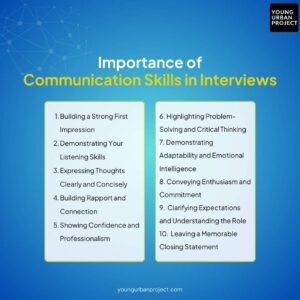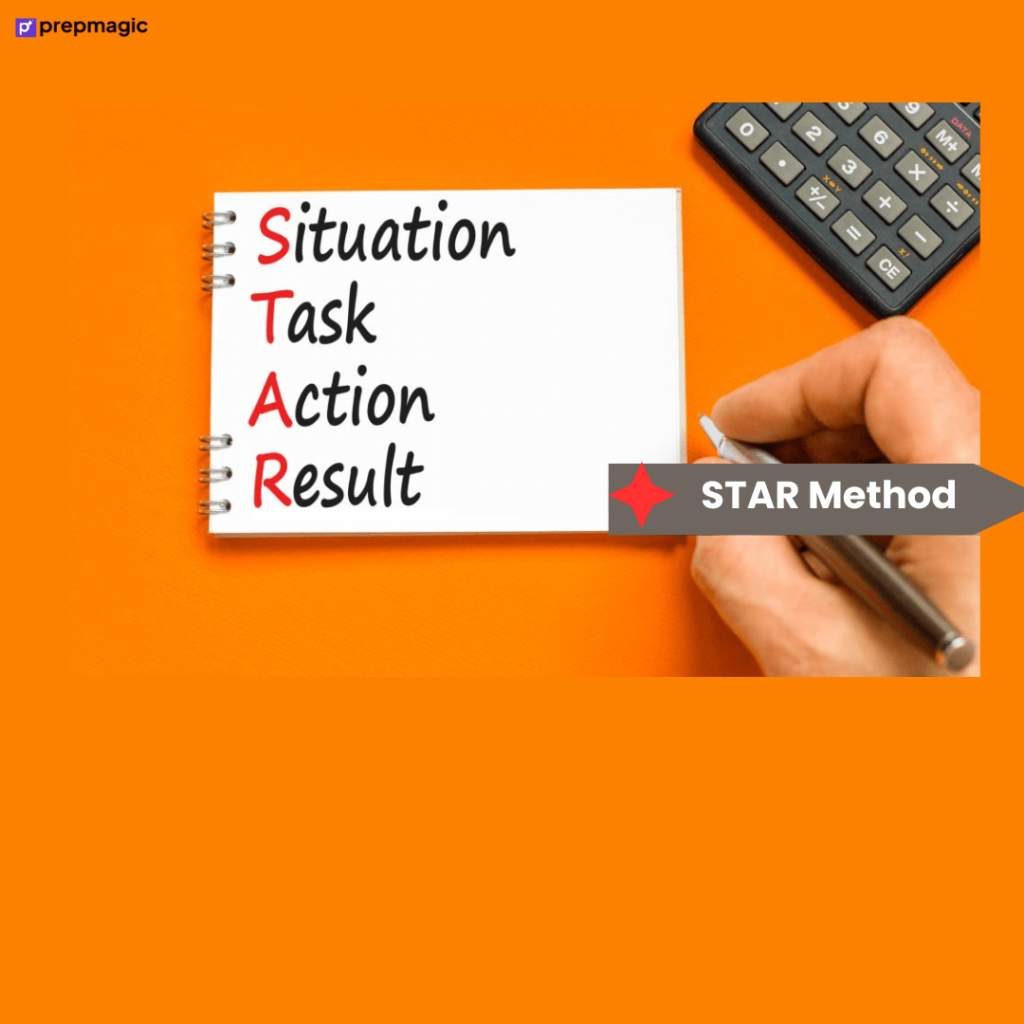In an interview, your communication skills play a significant role in setting you apart from other candidates. The importance of communication skills in interviews cannot be overstated, as they impact how well you articulate your thoughts, respond to questions, and build rapport with interviewers. Beyond technical qualifications, hiring managers look for candidates who can effectively convey their ideas, listen actively, and adapt their communication style to different audiences. Mastering these skills can leave a lasting impression and significantly boost your chances of landing the role.
Below, we’ll dive into why communication skills are crucial in interviews, how they help you demonstrate professionalism and confidence, and specific strategies to improve them.
The First Impressions Start Here
It’s a cliché for a reason: first impressions do count. But in an interview, your initial handshake (or virtual greeting) and first few words can carry more weight than you might think. Before they even look at your credentials, interviewers will pick up on your tone, your confidence, and your ability to engage.
Your initial moments are not about fancy words or rehearsed speeches. It’s more about authenticity, active listening, and clear articulation. These qualities are all rooted in strong communication. From these very first interactions, an interviewer can get a feel for whether you’re someone they want on their team—and that’s huge.
Why Communication Skills in Interviews Matter
Effective communication isn’t just about speaking well; it’s about conveying your ideas clearly, listening actively, and adjusting your style to suit the situation. Here’s a closer look at why communication skills in interviews are crucial:
1. They Showcase Your Personality Beyond Your Resume
Communication skills allow you to reveal who you are beyond a list of accomplishments. They let interviewers see the “real you,” which is invaluable in today’s hiring world. Employers don’t just want someone with a degree or specific technical skills; they want someone who can bring their personality, enthusiasm, and unique approach to the team.
2. They Demonstrate Emotional Intelligence
Strong communicators are often seen as emotionally intelligent. Emotional intelligence, or EQ, means being aware of and managing your emotions effectively, while also understanding and empathizing with others. Interviewers love candidates with high EQ because they tend to work well with others, stay calm under pressure, and adapt to workplace changes—all essential qualities for long-term success.
3. They Reflect How You’ll Interact with the Team and Clients
Your interviewer wants to know how you’ll fit in, and communication is a huge part of that. Effective communication skills in interviews show potential employers how you might handle team projects, client calls, or even difficult conversations. Good communication makes you a better teammate, a stronger leader, and a more reliable problem-solver.
Importance of Communication Skills in Interviews
In an interview, your communication skills are often the first impression you make on a potential employer, and they can make or break your chances of landing the job. Communication is more than simply speaking or answering questions; it involves listening actively, reading non-verbal cues, responding with clarity, and adapting to different personalities and tones. Strong communication can convey confidence, preparedness, and a good fit for the company culture—all of which are critical in interview settings.
Here’s an in-depth look at why communication skills hold so much weight in interviews:

1. Building a Strong First Impression
Employers often form an impression of a candidate within the first few minutes of an interview, and much of this judgment comes down to how you communicate. Good communicators start with a firm handshake, maintain eye contact, and introduce themselves confidently, setting a positive tone. A strong initial impression can lead interviewers to see you as competent and personable, two qualities every organization values.
Why This Matters: A solid first impression is often a preview of how you might interact with colleagues, clients, or stakeholders if hired. For client-facing or team-oriented roles, communication is essential, and interviewers are looking for candidates who can engage well with others right from the start.
2. Demonstrating Your Listening Skills
Interviews are as much about listening as they are about speaking. By paying close attention to each question, you demonstrate respect and attentiveness, which are crucial in any collaborative work environment. Active listening also helps you provide thoughtful, relevant responses, showing the interviewer that you fully understand their questions and concerns.
Why This Matters: When you’re attentive and focused on the interviewer’s words, you signal that you’re open to understanding others’ perspectives and can work effectively in a team setting. Listening skills are particularly valued in leadership roles, where understanding diverse viewpoints is essential for effective decision-making.
3. Expressing Thoughts Clearly and Concisely
Clarity and conciseness in responses are highly valued in interviews. An interview isn’t just about what you say; it’s also about how well you convey your thoughts. Being clear and to-the-point shows that you’re capable of organizing information effectively, a skill that’s beneficial for written and verbal communication within any organization. Rambling, on the other hand, can make you seem unfocused or unprepared, detracting from your professionalism.
Why This Matters: Clear communication is key in any professional setting, whether you’re explaining a project to a client or summarizing data for a manager. Interviewers assess this ability to see if you can distill complex information into straightforward, actionable insights, an invaluable skill across job functions.
4. Building Rapport and Connection
Effective communication allows you to connect with interviewers on a personal level, which can help you stand out from other candidates. By responding naturally to questions and displaying empathy, warmth, and attentiveness, you can make a genuine connection that leaves a lasting positive impression.
Why This Matters: Building rapport demonstrates that you have the interpersonal skills needed to work well with colleagues, clients, and management. Many hiring decisions come down to cultural fit, and showing that you can establish rapport easily is a huge advantage.
5. Showing Confidence and Professionalism
Confidence is conveyed through words, tone, body language, and overall demeanor. Strong communicators present themselves with assurance, even when discussing challenges or weaknesses. This level of professionalism indicates that you can handle workplace pressures and interactions gracefully, regardless of the situation.
Why This Matters: Employers are looking for candidates who can maintain their composure and represent the company positively. Whether it’s addressing concerns from a client or handling feedback from management, confidence and professionalism are essential qualities that speak volumes about your work ethic and resilience.
6. Highlighting Problem-Solving and Critical Thinking
Good communication skills allow you to articulate problem-solving abilities and critical thinking. Many interview questions are designed to gauge how you approach challenges and make decisions. If you can communicate your thought process and justify your decisions clearly, you’ll demonstrate the analytical skills that are invaluable in any job.
Why This Matters: Employers need people who can think on their feet and tackle issues methodically. When you’re able to communicate a structured approach to problem-solving, you show that you’ll be an asset in difficult situations and can make logical decisions under pressure.
7. Demonstrating Adaptability and Emotional Intelligence
Communication involves adapting your style to suit different personalities and scenarios. Each interviewer will have their own communication style, and adjusting yours to meet theirs shows adaptability and emotional intelligence. This skill is vital in today’s diverse workplaces, where flexibility and cultural sensitivity are increasingly valued.
Why This Matters: Adaptable communicators often succeed in dynamic, team-oriented environments. Emotional intelligence—the ability to recognize and respond to others’ feelings—is a highly sought-after trait in leaders and collaborators. Demonstrating it in an interview signals that you’re not only a good communicator but also emotionally aware and responsive to others’ needs.
8. Conveying Enthusiasm and Commitment
Your communication style in an interview reflects your enthusiasm for the role and company. Expressing interest goes beyond simply saying you want the job—it involves asking insightful questions, engaging with the interviewer’s statements, and showing that you’ve done your homework on the company. Enthusiasm is contagious, and interviewers often respond positively to candidates who genuinely seem excited about the opportunity.
Why This Matters: Companies want employees who are genuinely motivated and aligned with their mission. When you communicate enthusiasm effectively, it reassures employers that you’ll be dedicated to your work and contribute positively to the company culture.
9. Clarifying Expectations and Understanding the Role
Communication skills are essential for understanding job expectations and responsibilities. By actively engaging in questions about the role, you demonstrate that you’re serious about ensuring the position aligns with your career goals. Moreover, asking questions also helps you assess if the job truly fits what you’re looking for.
Why This Matters: Miscommunication or misunderstandings about job responsibilities can lead to dissatisfaction on both sides. When you communicate openly and ask thoughtful questions, you show that you’re committed to aligning with the role and ready to contribute effectively.
10. Leaving a Memorable Closing Statement
How you close an interview can leave a lasting impression. A well-thought-out closing statement that summarizes your interest, gratitude, and key skills can reinforce the value you bring to the role. This is your final opportunity to solidify your candidacy, and confident, articulate communicators tend to stand out here.
Why This Matters: A strong closing statement shows interviewers that you’re proactive, organized, and genuinely interested in the position. It also reflects confidence and self-awareness, two qualities that can set you apart in a competitive job market.
Essential Communication Skills for Interviews

1. Active Listening
Listening might be the most underrated part of communication, but it’s a game-changer in interviews. Active listening is the ability to fully concentrate on what the interviewer is saying, understand it, and respond thoughtfully. It’s more than just waiting for your turn to speak; it’s engaging with what the other person is saying in real time.
When you actively listen, you’re more likely to provide relevant answers and avoid misunderstandings. Plus, it demonstrates respect and shows that you value the interviewer’s perspective—a quality that will serve you well in any role.
2. Non-Verbal Communication
Believe it or not, your body language says as much as your words. Good non-verbal communication includes eye contact, nodding to show understanding, maintaining an open posture, and using gestures naturally to emphasize points.
Pro Tip: Avoid crossing your arms or looking away frequently. These can make you appear disengaged or even defensive. When your body language aligns with your verbal responses, you come across as confident, trustworthy, and approachable.
3. Storytelling
Storytelling isn’t just for authors or marketers; it’s a powerful communication tool in interviews too. Being able to tell a clear, engaging story about your experiences can make you unforgettable. Whether you’re explaining how you handled a past project or overcame a challenge, framing your experiences as stories adds personality and makes your points more compelling.
Start with the situation, explain your actions, and finish with the result—keeping it concise and relevant. This structure, often called the STAR method (Situation, Task, Action, Result), is an interview staple, especially for behavioral questions.
4. Clear and Concise Language
Clarity is key. Speaking clearly and concisely doesn’t mean dumbing down your ideas—it means expressing them in a way that’s easy to understand. Avoid jargon and overly complex language unless it’s industry-specific and relevant. Keep your answers focused and direct, especially when discussing your skills, strengths, or relevant experience.
5. Empathy and Adaptability
Adapting your communication style based on cues from the interviewer can make a world of difference. For example, if the interviewer seems highly analytical, try incorporating data or specific examples in your answers. Conversely, if they’re more conversational, don’t be afraid to relax a bit.
Empathy means being aware of the other person’s perspective, which is especially useful when discussing challenging topics. Adaptability and empathy go hand-in-hand to make you a more compelling communicator.
Common Interview Scenarios Where Communication Skills Matter
1. Behavioral Questions
Behavioral questions (“Tell me about a time when…” or “Describe a situation where…”) are the gold standard in interviews for assessing a candidate’s interpersonal and communication skills. This type of question lets interviewers see how well you can communicate under pressure, articulate past experiences, and demonstrate relevant skills.
To nail these, prepare responses that focus on both the technical and interpersonal sides of the situation. For instance, if asked about a time you handled conflict, focus on how you listened, empathized, and found common ground.
2. Handling Unclear Questions
Not every interviewer is going to phrase their questions perfectly. Sometimes, you’ll get a question that’s vague or confusing. This is an opportunity to demonstrate your communication skills. Ask clarifying questions like, “Just to make sure I’m answering correctly, are you asking about…?” This not only shows you’re thoughtful but that you value clear understanding.
3. The “What’s Your Biggest Weakness?” Question
This classic question is an interview staple, but it’s also a test of self-awareness and communication. The trick here is to acknowledge an area where you could improve, but to do so with honesty and optimism. For example: “I used to struggle with public speaking, but I’ve been working on it by practicing presentations in small groups. It’s still a work in progress, but I’m seeing improvement.”
By answering honestly and describing your growth, you show that you’re not only a self-aware communicator but also someone who’s proactive about self-improvement.
How to Improve Your Communication Skills for Interviews
Improving your communication skills isn’t something that happens overnight, but with consistent practice and the right techniques, you can become a more confident and effective communicator. Here’s a detailed look at practical steps to refine your communication skills specifically for interviews:
1. Practice with Common Interview Questions
To build confidence, start by practicing responses to common interview questions. Go beyond the standard “tell me about yourself” and dig into behavioral questions that require you to articulate experiences and problem-solving strategies. Focus on clarity, conciseness, and relevance in your answers.

Tips for Effective Practice:
-
- Use the STAR method (Situation, Task, Action, Result) to structure responses. This helps you stay organized and keeps your answers relevant.
- Try practicing in front of a mirror to observe your body language and facial expressions.
- Record yourself speaking, and then play it back. Listening to yourself can help you identify any filler words (like “um,” “you know,” “like”) or overly complex language that might dilute your message.
2. Engage in Mock Interviews with Feedback
Simulated interviews are an excellent way to get comfortable in a real interview setting. Many career centers, online platforms, or even friends and family can conduct mock interviews and give you objective feedback on your performance.
Benefits of Mock Interviews:
-
- You’ll experience the pressure of real-time questions, which helps you practice responding on the spot.
- Constructive feedback can reveal specific areas for improvement, like unclear explanations, lack of eye contact, or weak storytelling.
- A variety of interviewers can expose you to different question styles, allowing you to practice adapting to various personalities and tones.
3. Build a Story Bank of Experiences
Preparation isn’t about memorizing responses but rather having a mental “story bank” of your experiences. Think of key projects, challenges, and accomplishments that reflect your strengths and skills. Each story should highlight a specific skill or value relevant to the job you’re applying for.
How to Build a Story Bank:
-
- List significant achievements, learning experiences, or obstacles from your career, school, or volunteer work.
- For each story, identify which skills or qualities it demonstrates—such as leadership, problem-solving, resilience, or teamwork.
- Practice telling each story with the STAR method. This not only keeps you organized but also helps interviewers follow along easily.
4. Improve Your Non-Verbal Communication
Communication isn’t just about words. Body language, eye contact, and facial expressions all contribute to how your message is received. Non-verbal cues can make you seem approachable, confident, and engaged—or, conversely, disinterested or nervous.
Ways to Improve Non-Verbal Communication:
-
- Maintain Open Body Language: Avoid crossing your arms or slouching, as these can appear defensive or uninterested. Sit up straight, lean in slightly when speaking, and keep your hands relaxed.
- Eye Contact: Good eye contact shows confidence and attentiveness. If maintaining eye contact makes you nervous, try looking at the interviewer’s forehead or between their eyes. Practice with friends or in front of a mirror to build comfort.
- Hand Gestures: Use hand movements to emphasize key points naturally. Too much gesturing can be distracting, so aim for moderation.
- Facial Expressions: Show engagement and enthusiasm by smiling when appropriate. Avoid a “blank” expression that can make you appear disinterested.
5. Develop Your Listening Skills
Active listening is one of the most crucial aspects of communication. Many candidates are so focused on preparing responses that they forget to fully engage with the interviewer’s words. Listening closely can also help you tailor your answers and ask insightful questions, which shows that you’re attentive and respectful.
Strategies for Active Listening:
-
- Paraphrase Questions: If a question seems complex or vague, paraphrase it back to the interviewer to confirm your understanding. For example: “Just to clarify, you’re asking about how I handled a challenge in my previous role, correct?”
- Pause Before Responding: This not only gives you a moment to think but also prevents interrupting the interviewer. A short pause demonstrates that you’re considering their question carefully.
- Use Non-Verbal Acknowledgments: Simple cues like nodding, maintaining eye contact, or even a small smile show the interviewer that you’re engaged and understand their point.
6. Enhance Clarity and Brevity
Interviews require clarity and conciseness. Rambling or over-explaining can dilute the impact of your responses. Focus on expressing your points clearly and directly, without straying off-topic.
Tips for Clear and Concise Language:
-
- Avoid Filler Words: Words like “um,” “like,” and “you know” can distract from your message. Pause briefly instead of filling space with these words, and it will help you sound more composed.
- Simplify Complex Ideas: If you’re discussing technical skills or intricate processes, break them down into simpler terms. Avoid jargon unless you’re sure the interviewer will understand it, and clarify any technical language with simple analogies or explanations.
- Get to the Point Quickly: Try not to bury your main point in lengthy explanations. Start with the most important part of your answer, then provide supporting details as needed.
7. Work on Empathy and Adaptability
Interviews are dynamic, and adapting to the interviewer’s style or mood can help build rapport. If the interviewer seems more formal, match their professionalism. If they’re conversational, ease up on formality. This flexibility makes you seem both emotionally intelligent and easy to work with.
Ways to Enhance Empathy and Adaptability:
-
- Observe the Interviewer’s Cues: Pay attention to their reactions and adjust accordingly. If they seem intrigued by a specific answer, expand a bit. If they look pressed for time, aim to keep responses brief.
- Mirror the Interviewer’s Tone: If the interviewer is relaxed and friendly, mirror that tone to create a natural rapport. Conversely, if they’re more formal, match that professionalism.
- Acknowledge the Interviewer’s Perspective: If they share insights about the role or the team’s challenges, show empathy by acknowledging those points. For example, you might say, “I can see how that would be challenging, especially with a fast-moving project timeline.”
8. Master Storytelling Techniques
People remember stories much more easily than lists or technical jargon. Developing storytelling skills allows you to create a vivid, memorable picture of your experiences. This is especially useful for behavioral questions, where interviewers want to see how you think, feel, and react in different situations.
How to Craft Memorable Stories:
-
- Use the STAR Method: Structure your stories with Situation, Task, Action, and Result. This keeps your narrative focused and engaging while ensuring you cover all relevant details.
- Add a Personal Touch: Highlight your thought process or emotions to make your story relatable. Instead of just stating what you did, explain why you chose a particular approach or how you felt about the outcome.
- Practice Storytelling Delivery: Rehearse your stories aloud so they flow naturally. Practice emphasizing key points or using pauses to create impact.
9. Embrace the Power of Pauses
Silence can feel uncomfortable, but pauses are powerful in communication. They give you time to collect your thoughts and help listeners absorb what you’re saying. Pauses also prevent you from speaking too quickly, which can make you sound nervous or unprepared.
How to Use Pauses Effectively:
-
- Take a Breath Before Responding: After each question, take a brief pause before answering. This signals that you’re thoughtful and gives you time to organize your response.
- Pause for Emphasis: After making a significant point, use a short pause to let it sink in. This can make your statements more impactful and shows you’re in control of the conversation.
- Practice Pausing with Purpose: Practice incorporating pauses into your responses until they feel natural. This will also help you avoid filler words as you get more comfortable with silence.
10. Immerse Yourself in Great Communication Examples
One of the best ways to become a better communicator is to learn from those who excel at it. Whether it’s watching TED Talks, listening to engaging podcasts, or studying effective public speakers, exposure to great communicators can be inspiring and instructional.
How to Learn from Great Communicators:
-
- Analyze Their Techniques: Observe how they structure their points, use pauses, and emphasize key messages. Take note of their tone, pace, and choice of words.
- Try Shadowing Their Style: Practice incorporating elements from speakers you admire into your own communication style. You don’t need to mimic them exactly, but you can learn a lot by experimenting with their techniques.
- Listen Actively to Podcasts: Listening to engaging podcast hosts can expose you to natural conversational styles and transitions. This is especially useful for picking up on subtle conversational techniques.
Wrapping Up
Mastering communication skills for interviews is not just about acing a one-time conversation; it’s about building a foundation for professional success. The importance of communication skills in interviews cannot be understated, as they impact every facet of the process, from first impressions to closing statements. Strong communicators display confidence, actively listen, respond thoughtfully, and leave interviewers with a positive image of how they would interact in a workplace setting.
Improving these skills takes time and dedication, but the payoff is significant. Good communication can help you stand out in competitive interview settings, connect with potential employers on a personal level, and secure the job that aligns with your goals.
